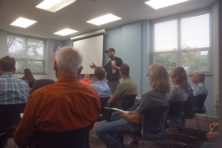First Hearing on Karst Changes for Ag Runoff
- Share
- Tweet
- Pin
- Share
The Wisconsin Department of Natural Resources (DNR) is holding its first public hearing Sept. 15 on the draft changes to state statute NR 151, targeting agricultural runoff in the karst geology of 15 Wisconsin counties.
The draft changes are the result of workgroups that met for nearly a year to address continuing groundwater quality issues in the karst region.
Rep. Joel Kitchens has been a major proponent of the targeted changes.
“I do hope the rules stay through relatively unchanged,” Kitchens said. “They’re pretty fair, and at least leaders in conservation groups and agriculture sounded supportive.”
“Given the well-documented groundwater quality issues, it makes sense to take targeted steps to further protect the environment and people’s health,” said Mike North, president of the Dairy Business Association (DBA), in a Sept. 13 press release.
The DBA, however, does have some reservations about the changes as proposed, including the inclusion of areas with more than five feet of soil.
The DNR wants to include areas with up to 20 feet of soil, but the dairy group wants the depth set at five feet.
“Verifying soil depth beyond a few feet rapidly becomes an expensive and cumbersome process,” North said.
The DBA also takes issue with the inadequacy of outdated soil-to-depth maps.
“The state needs new maps that are created using the most up-to-date techniques. We need more accurate information,” North said.
North also pointed out that because of broad exemptions existing in NR 151, smaller farms in the area would not be covered by the changes.
“This is not just a large-farm issue,” he said. “For meaningful water quality progress to be had, we need to move everyone toward compliance.”
That has been Kitchens’ mantra all along: “Every single field needs to be dealt with properly,” he said.
On the conservation side, Wisconsin League of Conservation Voters (WLCV) Executive Director Kerry Schumann said in a press release that the rules do not go far enough to protect residents in places like Kewaunee County with serious well contamination, or to prevent similar crises from developing across the state.
“Though some of the rules are a step forward, the step is too short when measured against the scale of the drinking water crisis in Wisconsin,” Schumann said. “Fortunately, the public can now make its voice heard and help strengthen the rules to protect families who can’t drink water from their taps.”
Schumann said the rules should prohibit manure application on soil less than three feet deep over bedrock, and the DNR should map and collect geologic and water quality data in southwest Wisconsin to prevent a crisis similar to what is happening in Kewaunee County.
The public comment period on the rule changes will close Oct. 4. Send your comments to [email protected].
The Sept. 15 public hearing begins at noon with a presentation in the Phoenix Room at the University Union of the University of Wisconsin-Green Bay. The public comment period begins at 1 pm.
Read the draft changes here: dnr.wi.gov/news/input/documents/rules/WT1516DraftRule.pdf.

